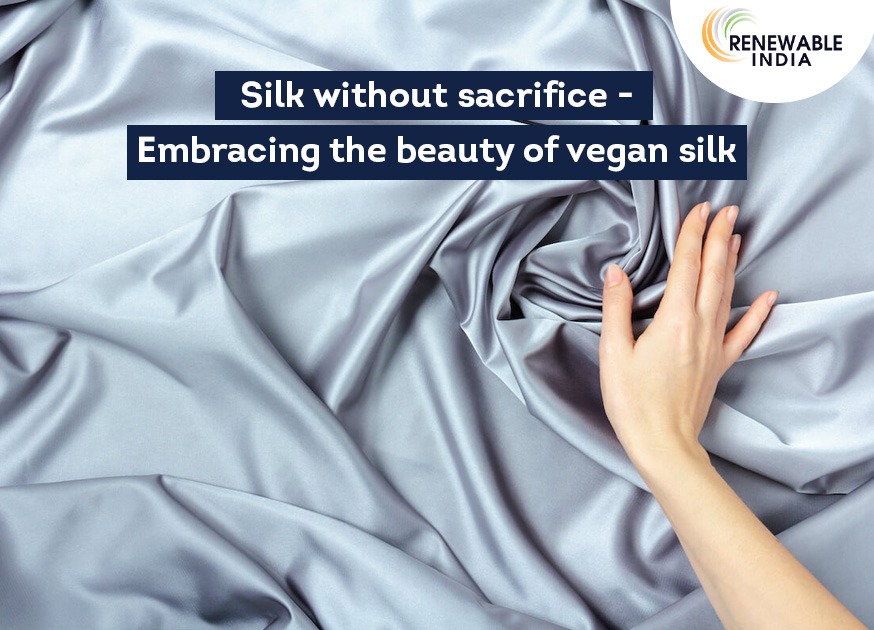
“No amount of beauty and elegance is worth a life.”
The saying goes perfectly in the context of the silk industry. Needless to say, silk sarees and suits are the epitome of class and style not only in the fashion industry but also in Indian society. Although there is nothing wrong with looking like a God/Goddess in silk, it is unethical to kill silkworms for procuring the expensive material. No need to fret! Now, you will be able to wear your favourite silk saree guilt free as there is a new kid on the block – Vegan silk.
Yes, the above claim is true. Vegan came into the limelight recently when Tata-owned ‘Taneira Vegan Visions’ launched its collection in collaboration with ‘Tencel Luxe’. The introduction of the brand in the market proved that you can use as much silk as you want without compromising on the quality of the material. Before we throw light on the benefits and kinds of vegan silk, it is imperative to understand a bit about the history of silk in our country- India.
History of the Silk Industry in India
During the colonial period, the British East India Company brought silk to India and taught new reeling methods for silk production to lower costs and increase profits in foreign markets. This was part of the British colonial strategy to maximize profits from Indian resources and markets. In addition to imposing high taxes on Indian silk production and export, the British encouraged the cultivation of silk in India to reduce reliance on imported silk from China and other nations.
Types of Vegan Silk in India
Categories of vegan silk can be divided based on the material used in the making
(i) Lotus silk, also known as ‘lotus fibre’, is a unique and elegant type of vegan silk that is created from lotus plant fibres. This luxurious fabric is distinguished by its distinct texture, softness, and natural lustre.
(ii) Ramie silk, another type of vegan silk, is manufactured from the fibres of the Ramie plant. This durable fabric is known for its strength, ability to hold shape, and hypoallergenic properties. It also has a natural lustre.
(iii) Bamboo silk, made from bamboo plant fibres, is a soft and durable type of vegan silk that is also sustainable. This fabric is known for its luxurious feel and ability to drape well, making it a popular choice for clothing and home decor.
Advantages of plant-based silks
1. Hypoallergenic – Every person has a different skin texture. Not everyone is comfortable with the same material. However, plant-based silk guarantees comfortable usage without any possibility of allergy
2. Eco-friendly – Vegan silk is a hundred percent renewable cruelty-free material. If you can switch to almond milk for lactose intolerance then why it is so difficult to go for this biodegradable material to save the life of these tiny living beings
3. Multipurpose – The versatile nature of plant-based silk makes it unique among its counterparts. Be it accessories, clothes, home decor, or furniture, vegan silk is the one-stop solution for all your ornamental requirements
4. Durability – A question may arise in your mind if the silk produced from plants will be as durable as the traditional ones. Well, you don’t need to worry about its durable nature. They are stronger than the ones made from silkworms
Will silk industry workers lose jobs if we start using plant-based silks?
There has been a lot of discussion regarding the benefits of vegan silk, but some people have expressed concerns about the impact on those currently working in the animal-based silk industry. However, it’s important to understand that as more people become aware of the negative consequences associated with animal-based silk, there will be a growing demand for alternative, cruelty-free options.
This increase in demand for vegan silk will likely lead to a shift in the industry towards the production of this sustainable alternative, creating new job opportunities for workers. Rather than job loss, the launch of vegan silk could lead to an increase in the demand for labor, as the production and procurement of vegan silk will require a skilled workforce.
Conclusion
The change to vegan silk offers not only a more ethical and sustainable option but also a step towards establishing new job prospects in the industry for skilled people. As we grow more aware of the impact of our choices on the environment and the lives of animals, it’s encouraging to know that there are feasible alternatives that can provide us with the same beauty and elegance without sacrificing the lives of silkworms. Let us embrace the future of plant-based silk and make a positive difference in the lives of our planet’s people. Remember, no amount of beauty or elegance is worth sacrificing a life.
Leave a Reply